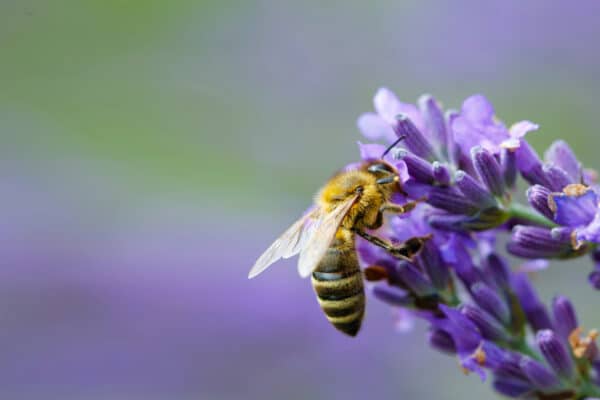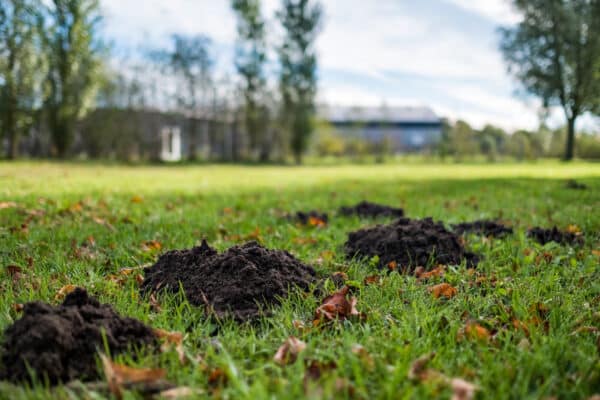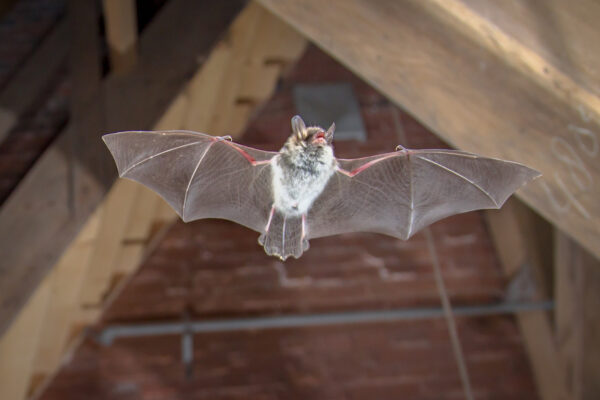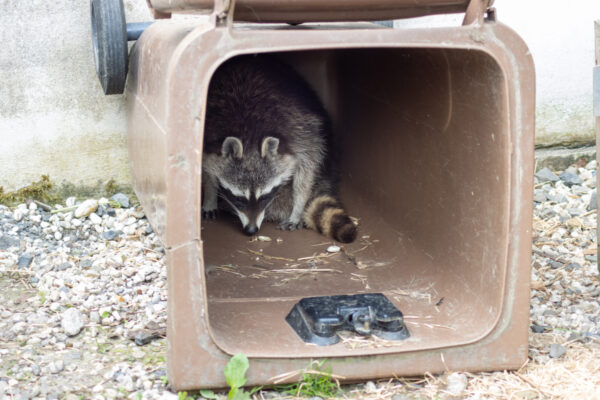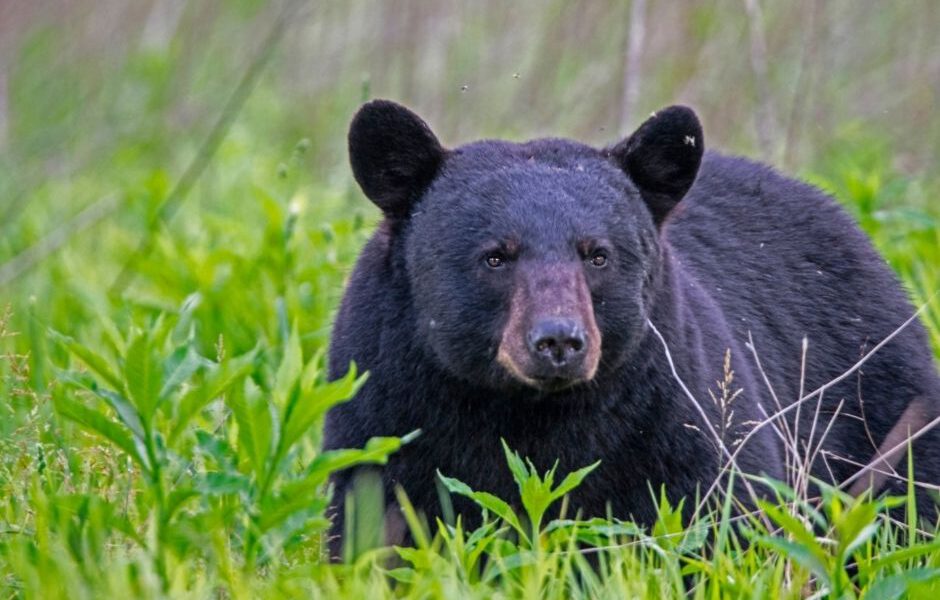
The shy, solitary, and stunning Black Bear is Alabama’s state mammal. What a treat it would be to see one in the wild!
Knowing What to Do if You See a Black Bear is Key
However, sightings are rare. And not everyone knows how to handle a Black Bear encounter correctly. So, the question arises- What do you do if you spot a Black Bear in Alabama?
That’s precisely what Covenant Wildlife will answer in this blog. Continue reading to know what to do if you come face to face with a Black Bear and how to avoid an unlikely attack.
We’ll begin with getting familiar with the Black Bear, how to identify it, and where they are living in our state. Read on to discover what Covenant Wildlife has to say about the uncommon Black Bear encounters in Alabama.
Getting Familiar with the Black Bear
Let’s first get to know this furry fellow. The Black Bear, or Ursus americanus, is the smallest of three bear species in the country and the most common.
What Does a Black Bear Look Like?
The Black Bear has a thick shaggy coat varying in colors like black, dark brown, red-brown, and yellow-brown. They can weigh around 200 pounds and measure about five feet long from snout to tail. However, males are typically larger than female Black Bears.
The Black Bear’s long snout is a lighter brown than the rest of its body. And its head is relatively small with little brown eyes and rounded ears.
Additionally, Black Bears have short and sharp claws for climbing trees.
Where Do Black Bears Live?
The Black Bear’s ideal home consists of thick forest, an abundant food source, and nearby water. They are found in the wooded lands of Canada, the United States, and Mexico.
It’s estimated that roughly 300,000 Black Bears dwell in all but ten states throughout the country. For this reason, it’s no wonder the Black Bear is commonly referred to as The American Bear.
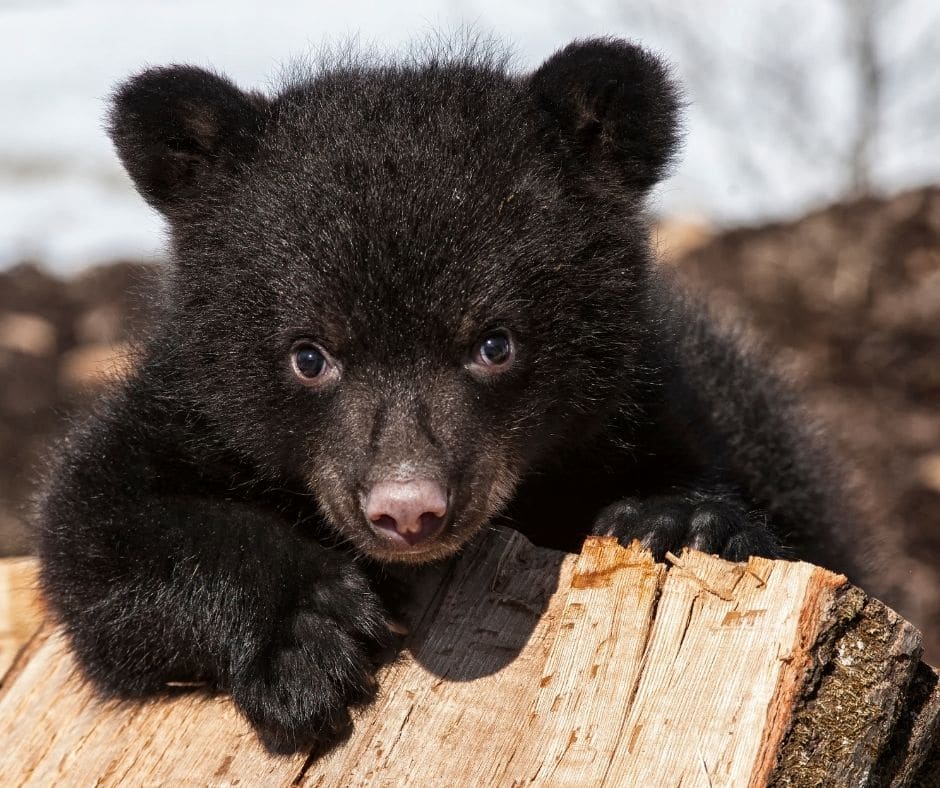
Black Bears in Alabama
The Black Bear is the only Bear species living in Alabama, and its population is pretty small. In fact, for a period, Black Bears had almost disappeared from their Alabama territories. Due to human expansion, the loss of habitat, and over-hunting, we almost lost our Black Bears entirely. However, in the last decade, populations have been on the rise. Black Bears from northern Georgia have begun to move into our state.
Today, you can spot Alabama’s Black Bears in Cherokee, Etowah, and DeKalb counties in the northeast and Mobile and Washington in the southwest. That is if you’re lucky.
It’s estimated there are about 300 to 1,000 Black Bears dwelling in Alabama. And with this and their tendencies to stay away from humans, sightings are rare.
During late spring and summer, though, male Black Bears will travel great distances searching for a mate. During this time, when bears are on the move, the chance of seeing one is more likely, although still uncommon.
What Should You Do if You See a Black Bear?
In most cases, a wild Black Bear will leave you be. Naturally, they are shy and avoid humans at all costs. That being said, they can occasionally become a threat if they sense danger or have their young nearby. Still, aggression is often a result of irresponsible human behavior, like approaching, harassing, or attempting to feed the bear.
Regardless, there’s no need for the residents of Alabama to fear our furry neighbors. In fact, Black Bears have only caused the death of about 60 individuals since 1900 in North America. In other words, death by bees, lightning, and murder are all more likely to happen than a fatal Black Bear attack.
If you feel threatened or in danger in the presence of a Black Bear, take the following actions to ensure your safety:
- Stay calm and do not run, but slowly back away.
- Avoid direct eye contact and check to see if the bear has a path to escape.
- Make yourself appear as big as possible. You can do this by raising your arms high above your head or using a jacket or backpack to do the same.
- Make loud noises by shouting assertively and clapping your hands.
- If the unthinkable happens and the bear begins to charge, do not play dead. Fight back with all you have. Black Bears are strong but will tire quickly. Putting up a fight will likely cause the bear to give up.
More About Alabama’s Black Bears
To know a little more about our wild neighbors and the state mammal of Alabama, let’s explore the bear’s eating habits and behaviors.
What Do Black Bears Eat?
Black Bears are omnivorous mammals, like us. Most of their diet consists of vegetation, such as nuts, herbs, roots, grasses, and fruits. However, if the opportunity arises, they’ll get their paws on a fish or smaller mammals. Insects make for excellent nutrition, as well.
Less often, the Black Bear will consume diseased animals or rummage through our outdoor trash bins.
Some of the Black Bear’s favorite foods are:
- Clovers and dandelions
- Young moose or deer
- Blueberries and strawberries
- Honey
What Do Black Bears Do?
Beyond scavenging for their next meal, Black Bears have some fascinating and unique behaviors. They are active mainly during the day, starting the day before sunrise and settling in for the night just before sundown. Though, Black Bears living near people may be more active in the evening to avoid human contact.
They are a shy and solitary species. The Black Bear will spend most of its life alone. Occasionally, you may spot Black Bears gathering for the mating season or feeding in an area where food is abundant.
Black Bears hibernate during the harsh winter months. Before they hide away in their dens, Black Bears will consume much more food to prepare for the weeks without.
Additionally, Black Bears are skilled climbers and can run up to 30 miles per hour. However, their endurance isn’t very impressive. Black Bears may run fast but will tire quite easily.
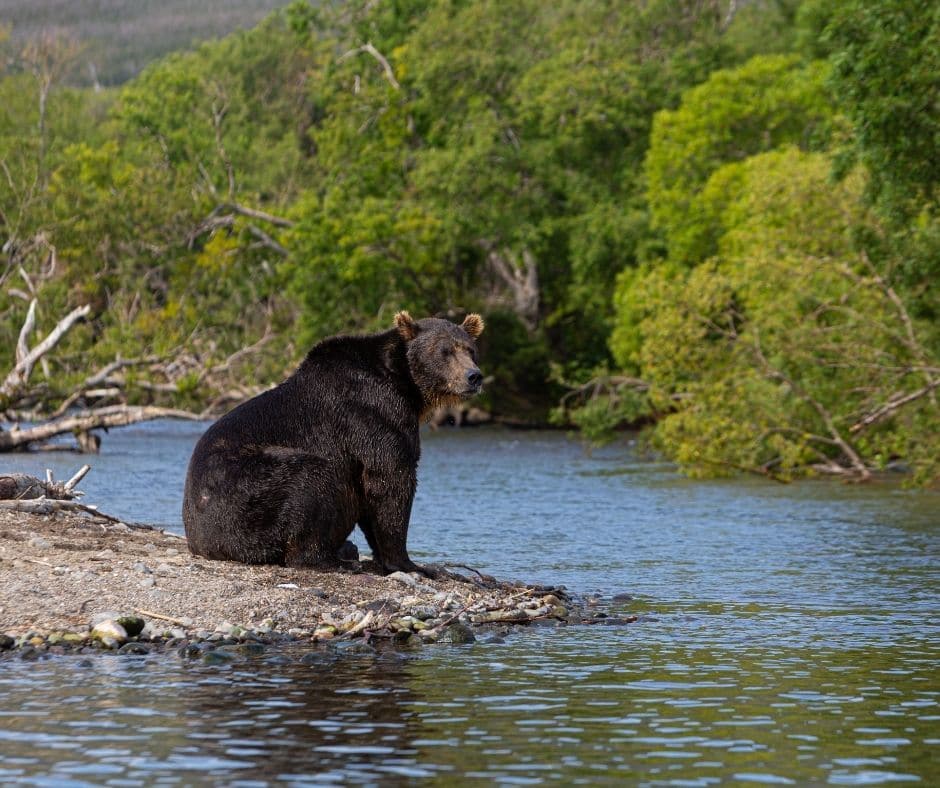
Staying Safe Around Alabama’s Black Bears
Part of respecting and admiring the mighty Black Bear is to know how to live alongside it without conflict. Black Bears make the work easy because of their habit of keeping their distance from us. However, we have a role to play, too.
For many years, there have been no reports of Black Bear attacks in Alabama. Nevertheless, it is essential to know how to live among the species, especially if you spend plenty of time outdoors hiking or camping in their territories.
Check out these additional safety tips every Alabama resident should be aware of:
- Never feed our Black Bears.
- Use bear-proof trash bins for outdoor waste.
- Do not leave pet food or animal feed outside.
- Never approach a wild Black Bear for any reason.
- Avoid feeding birds and other animals when bears are most active in spring and summer.
- Keep outdoor grills clean and stored away.
- Communicate with your neighbors and community about any known bear activity.
- Camp safely by being aware of Black Bears and implementing bear safety procedures.
- When enjoying the outdoors, carry bear spray or pepper spray in case of an emergency.
Contact the Pros at Covenant Wildlife Removal
If you’ve encountered a Black Bear in your yard or perhaps while spending time in the great outdoors, the most important thing to do is ensure your safety.
And once it is safe to do so, call your local wildlife removal company. Covenant Wildlife takes these matters very seriously. You can count on us.
Reach out to us right away if you’ve spotted Black Bears on your property.
Or click here for a free inspection with our expert team of wildlife removal specialists.
